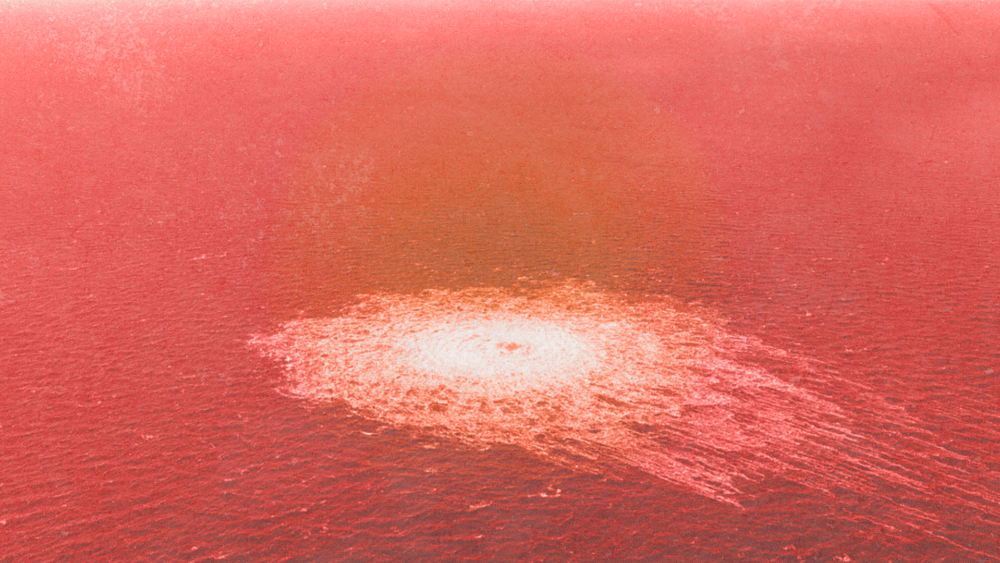EU inaction in the aftermath of this US attack suggests that it is at best a protectorate and at worst occupied territory
“Any deliberate disruption of active European energy infrastructure is unacceptable and will lead to the strongest possible response” was Ursula von der Leyen’s reaction to the twin explosions that destroyed the pipelines supplying natural gas to the EU across the Baltic Sea. Two weeks later, the German Public Prosecutor General launched an investigation into this “serious violent attack on national energy supply, likely to impair Germany’s external and internal security”. Five months on, separate investigations by Germany, Denmark and Sweden have indicated that the explosions were a deliberate act of sabotage. Yet none have identified the perpetrator.
The Nord Stream pipelines were jointly owned by European energy firms from Russia, France, the Netherlands and Germany. They took over 15 years and around $20 billion to construct and were essential to the energy security of Europe and the very viability of Germany’s industrial economy. Truth be told, the reliance on fossil fuels, that made this infrastructure so valuable, also made it untenable in light of the climate crisis.
In fact, DiEM25 had opposed the construction of Nord Stream 2 and, in the aftermath of the sabotage, proposed the reordering of Germany’s economy around local, decentralised renewable energy. Instead, the German government opted to import expensive LNG in violation of standing environmental regulations and to violently uproot entire communities to mine for more lignite. One way or another, the question of who carried out this attack and how they still get away with it has even deeper implications for the future of the EU.
Consider the sequence of events: In a joint press conference with German chancellor Olaf Scholz on February 7, 2022, US president Joe Biden declares that if Russia invades Ukraine “there will be no longer a Nord Stream 2, we will put an end to it“. On February 24, Russia invades Ukraine. On September 26, both pipelines are blown up. No one assumes responsibility, but former Polish foreign minister Radoslaw Sikorski hastens to tweet: “Thank you, USA.” It soon becomes apparent that, due to corrosion caused by sea water entering the pipelines, the damage to them will be complete and irreparable. On February 8 2023, the most celebrated US investigative journalist, Seymour Hersh, claims the US government was behind the attack. The White House calls his story “utterly false and complete fiction“. Two female elected politicians, Sevim Dağdelen in the German Federal Parliament and Clare Daly in the European Parliament, demand answers. For the German government and the EU executive, it is business as usual.
So who was responsible for severing – violently, secretly and irreversibly – the EU’s most important energy supply link?
Some Western officials have accused Moscow. While Russian president Vladimir Putin does not lack the cynicism to order covert bombing campaigns even against Russian citizens, this theory seems implausible. Russia had invested billions in this project and Gazprom was its major shareholder. In addition, the pipelines provided the Kremlin with a steady stream of high revenue and, more importantly, strong political leverage over Europe. Tellingly, 23 diplomatic and intelligence officials in nine different western countries told the Washington Post three months after the incident that they had yet to see evidence linking Russia to the attack. Neither had the German top prosecutor as recently as three weeks ago.
On the other hand, destroying strategic pipelines connecting the EU to Russia is fully in line with the Brzezinsky doctrine of keeping Eurasia divided, which is a decades-old central tenet of US global strategy. Moreover, this action on its own serves all three aims of NATO, as outlined by the Alliance’s first Secretary General: “keep the Russians out, the Americans in, and the Germans down.” It is also noteworthy that, in the past, NATO structures have orchestrated ruthless clandestine bombing campaigns on European soil, again in an effort to undermine Russian political influence.
Now if Seymour Hersh is right and the US blew up a key component of Europe’s energy infrastructure but denies doing so and no European authority dares to even question that assertion, what does that say about European sovereignty?
In international law, sovereignty refers to a government possessing full control over affairs within a certain geographical limit. In defending its inhumane migration policy, the EU Commission has repeatedly proclaimed nation-states’ land and sea borders to be EU borders. The two Nord Stream explosions in fact occurred outside the territorial waters of EU member-states but inside the Swedish and Danish Exclusive Economic Zones, where the two countries exercise sovereign rights. In political terms, however, state sovereignty is synonymous with political autonomy, independence, and the capacity to govern oneself free from outside interference.
Now the most plausible explanation for the Nord Stream explosions that can be discerned from publicly available information is the following: In pursuit of its political and economic aims in Europe, the US deployed military means in a covert operation to destroy critical European infrastructure, in order to irreversibly constrict the supply of energy to the EU and in turn limit its geopolitical autonomy. This is nothing short of an act of war. Coming from a hostile power, this would have caused outrage. Coming from the EU’s closest military ally, it doesn’t even seem to merit mention, let alone reaction. The fact that no European authority has lifted a finger in response to this act constitutes plain treason and is undeniable proof that the EU has surrendered its sovereignty. EU inaction in the aftermath of this US attack suggests that it is at best a protectorate and at worst occupied territory.
No other plausible explanation is seriously being put forward about who carried out this act of terrorism against Europe. Nevertheless, there is no sign of the slightest indignation on the part of ruling officials, nor any apparent urgency to get to the bottom of this. This cannot but signify that the EU is being terrorised into submission in the most cynical way by a foreign power and that EU leaders are mere puppets.
It is no secret that the US has exercised a dominating influence over European governments for decades. So far, however, blatant acts of terror had not been tolerated, at least officially. In the case of Gladio, the European Parliament issued a resolution pointing the finger at NATO, albeit long after the event. The handling of the Nord Stream affair exposes European political elites as no longer having the decency to acknowledge, let alone the will to resist outside control. Again, this amounts to a surrender of sovereignty. The Qatargate scandal provides further evidence in support of this hypothesis. Only, when it comes to transatlantic control, the stakes are much higher: the EU is in effect involved in a major war with ample room for further escalation, in which it has little say.
The case for a European transnational liberation struggle
This sense of deep betrayal is already shared – or is likely to be shared sooner or later – by many Europeans across the political spectrum. People on the right might accept being ruled by corporate technocrats in time of peace, but will find it harder to be governed by stooges of foreign powers in time of war. Most Europeans will not accept this without a fight and DiEM25 should not hesitate to take the lead. After all, what is the point of European democracy without European sovereignty?
History teaches that national liberation struggles afford rare opportunities for social, economic and political transformation. The largest pan-European revolution to date was fueled as much by democratic as by national aspirations. If it is true that the EU can no longer be reformed, then a European transnational liberation struggle against foreign domination can potentially unite enough people with enough conviction across the continent to actually transform it. This struggle does not have to be bloody, provided Europeans coordinate, act in step and stand united, which is what DiEM25 is already trying to achieve. The more solidarity they display among them, the more solidarity they will get from abroad, including from within the US.
A crucial question is how to lend progressive content to such a struggle. This of course hinges on the dilemma between nationalism and transnationalism. The challenge is to channel nationally inspired feelings of pride and independence into a rational transnational vision. Indeed, as multiple crises come to a head, DiEM25’s core thesis that solutions can only be transnational is more valid than ever.
National attempts at independence from US domination are bound to fail in the face of a divide-and-conquer strategy. Any country going it alone will soon see friction rise with neighbouring states, as the empire repositions accordingly and inevitably. Such outcomes could be readily envisaged in the case of Germany and Poland or Greece and Türkiye.
DiEM25 should highlight the fact that all divisions within Europe based on national biases, like taking sides in the ongoing war, do not stand to reason. In the case of most Europeans, which empire happened to oppress or benefit their ancestors in the past is a good predictor of their stance when it comes to great power conflict. The author of this article is no exception. But zooming out and adopting a transnational perspective reveals how arbitrary nationalist positions are and how little Europeans differ on things that really matter. Nationalism might have a romantic appeal, but transnationalism has a very rational appeal: in this day and age, it is nothing less than a prerequisite for collective survival.
The demise of EU sovereignty, long in the making but now undeniable thanks to the Nord Stream debacle, is an issue that can resonate with Europeans and further delegitimise the EU leadership. DiEM25 should rise to the challenge.
Firstly, by insisting on hard EU sovereignty today in the context of constructive disobedience, not least because this is a necessary – if not sufficient – condition for peace in Europe.
Secondly, by pressing the case for transnational, democratic, popular sovereignty of the EU, in defiance of domestic or foreign governments in the service of the oligarchy.
The vocabulary, the analysis and the alliances of the Progressive International are certainly pertinent to this effort, perhaps even insofar as decolonisation of the EU is a prerequisite for non-alignment. In any case, DiEM25 should include the recent evident loss of EU sovereignty in its analysis, without losing sight of who the real enemy is.
Do you want to be informed of DiEM25's actions? Sign up here















